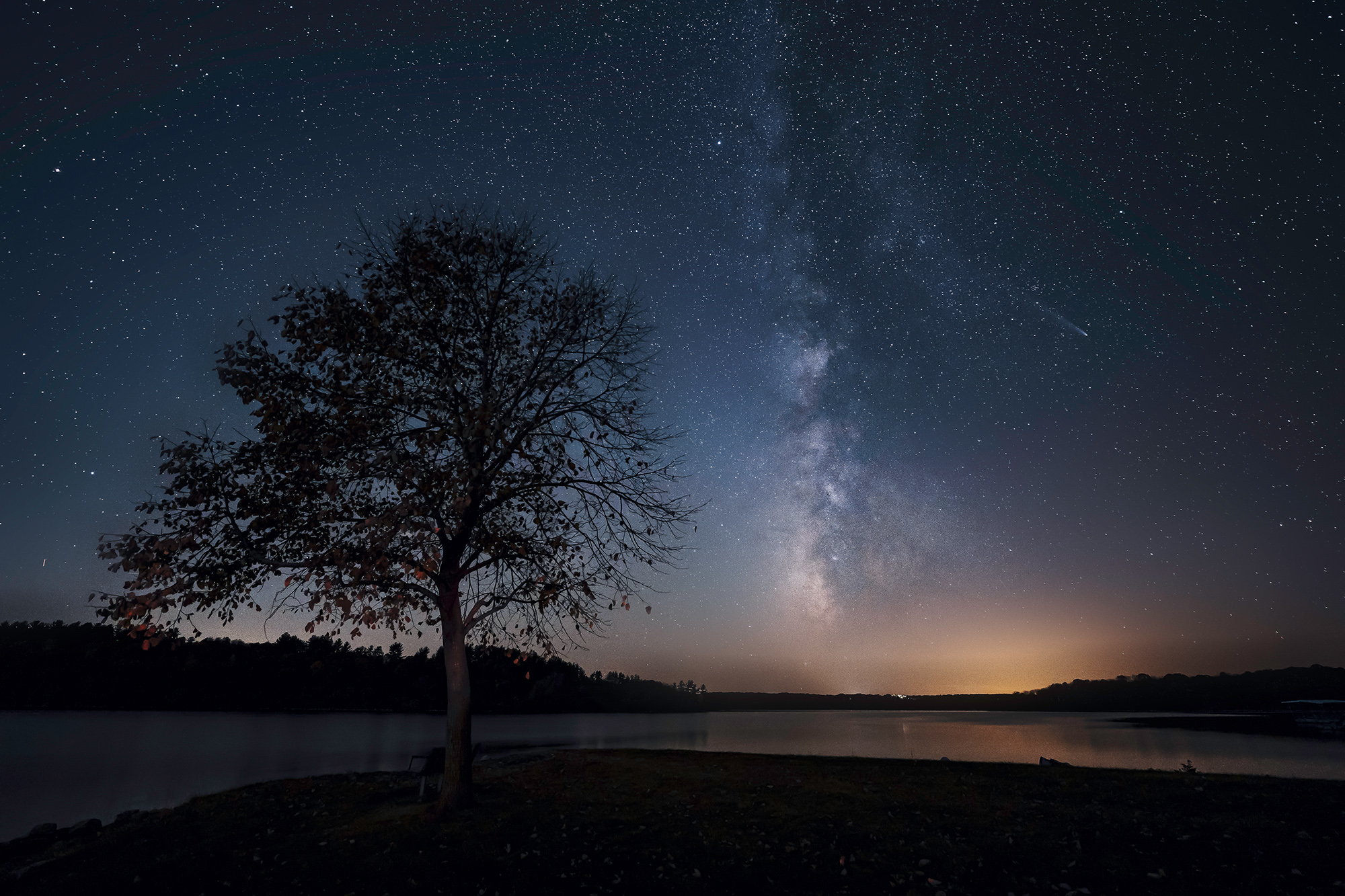The Milky Way galaxy and Comet C/2024 G3 (ATLAS) grace the sky over Thousand Hills State Park on a clear night in October 2024.
Published by
on
When the sun sets at Thousand Hills State Park on the outskirts of Kirksville, the night sky comes to life. As the blue sky darkens, it gains a sprinkling of stars, planets and galaxies. Visitors can see the Milky Way even from only a few miles outside of town. While Kirksville is not known for its dark skies, Thousand Hills State Park and area community members have been working to change that.
Many people who have viewed the night sky at the park will tell you it is incredibly beautiful, though it’s hard to ignore the glowing light pollution that reduces the visibility of stars along the horizon toward town. This situation is not unique to Kirksville — it is happening all around the world. The way artificial light has changed the night sky is one of the many reasons that some Kirksville residents have joined together to share this unique natural resource and work to ensure it remains for future generations.
In September 2024, Thousand Hills State Park became certified as an Urban Night Sky Place through DarkSky International. Any place that promotes nighttime experiences can apply for this certification regardless of its proximity to an urban environment. Receiving the Urban Night Sky Place certification marks Thousand Hills State Park as the 12th place in the world, second in Missouri, and the first Missouri State Park to receive the designation, which signifies the park’s diligent work to protect its night skies. (Stacy Park in Olivette was the first park in Missouri to receive the honor.)
Receiving the certification strongly supports the park’s mission to preserve and interpret the state’s most outstanding natural landscapes and cultural landmarks, and to provide outstanding recreational opportunities compatible with those resources. By protecting dark skies, the park is preserving a natural landscape. Through dark sky programming, the park creates recreational opportunities in line with that resource.
Not only is the mission supported, but dark skies are beneficial to the people and wildlife in and around the park. Naturally, humans rely on the cycle of light and dark. The overuse of artificial light can impact sleep and mental health, and can lead to higher risks for health complications. Our biological clock, or circadian rhythm, supports health in many ways, such as producing melatonin, which aids in sleep and immune function. By implementing proper artificial light management, we can help people who camp or use the park at night function on their natural cycle.
Many animals also rely on the natural cycle of light and dark to function. With an interrupted cycle, sleep, reproduction and feeding can be negatively impacted. This is not specific to one type of animal; many including amphibians, birds, mammals, insects and even plants need both light and dark to thrive. For example, prey animals often rely on darkness for protection. Without that protection, they are more vulnerable, and the ecosystem’s balance can be disrupted. By becoming night sky stewards, the park and its community members are helping restore nights to more traditional darkness, in turn giving the wildlife the natural cycle they need to be healthy.
Through the Urban Night Sky Place certification and work with DarkSky International, the park aims to educate people about light pollution and steps we can take to be better night sky stewards. DarkSky International has put together five principles for responsible outdoor lighting that focus on lights that are useful, targeted, low level, controlled and warm-colored. With these actions, we can all work to create safer spaces, save money and protect the night sky.
It starts with an idea
The idea for the DarkSky certification came about in early 2020 from a group of Truman State University students and their professor, Dr. Vayujeet Gokhale, met with Park Superintendent Ryan Persinger. In 2021, Persinger worked with DarkSky Missouri and DarkSky International to determine the most appropriate certification for the park and begin what would be a three-year application process.
Many factors went into the application to receive this certification. Periodic sky quality readings recorded the light pollution levels in areas of the park. Park management updated plans to highlight the importance of conserving the night sky. The park developed a light management plan that inventoried all outdoor light fixtures and planned to have them all become DarkSky-compliant by the end of 2025.
In addition to internal changes, the park gathered support letters from various community and state organizations in support of the park’s efforts to become certified. In collaboration with Truman State University and the Adair County Public Library, Thousand Hills started hosting regular astronomy programs for the public in 2021. This allowed the park to apply for the Urban Night Sky Place certification.
The work does not stop here. To maintain the certification, the park team will need to finish getting lights into compliance, continue educational programs and monitor sky quality readings. Park guests can enjoy the night sky at Thousand Hills State Park any time of the year.
If you are interested in attending an astronomy program at the park, visit mostateparks.com/park/thousand-hills-state-park.
For more information about DarkSky International or DarkSky certifications visit darksky.org.




